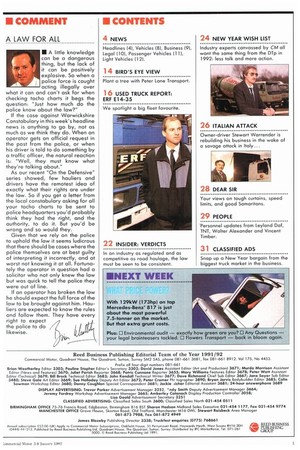A LAW FOR ALL
Page 3

If you've noticed an error in this article please click here to report it so we can fix it.
• A little knowledge can be a dangerous thing, but the lack of it can be positively explosive. So when a police force is caught acting illegally over what it can and can't ask for when checking tacho charts it begs the question: "Just how much do the police know about the law?"
If the case against Warwickshire Constabulary in this week's headline news is anything to go by, not as much as we think they do. When an operator gets an official request in the post from the police, or when his driver is told to do something by a traffic officer, the natural reaction is: "Well, they must know what they're talking about."
As our recent "On the Defensive" series showed, few hauliers and drivers have the remotest idea of exactly what their rights are under the law. So if you get a letter from the local constabulary asking for all your tacho charts to be sent to police headquarters you'd probably think they had the right, and the authority, to do it. But you'd be wrong and so would they.
Given that we rely on the police to uphold the law it seems ludicrous that there should be cases where the police themselves are at best guilty of interpreting it incorrectly, and at worst not knowing it at all. Fortunately the operator in question had a solicitor who not only knew the law but was quick to tell the police they were out of line.
If an operator has broken the law he should expect the full force of the law to be brought against him. Hauliers are expected to know the rules and follow them. They have every right to expect the police to do likewise.
























































